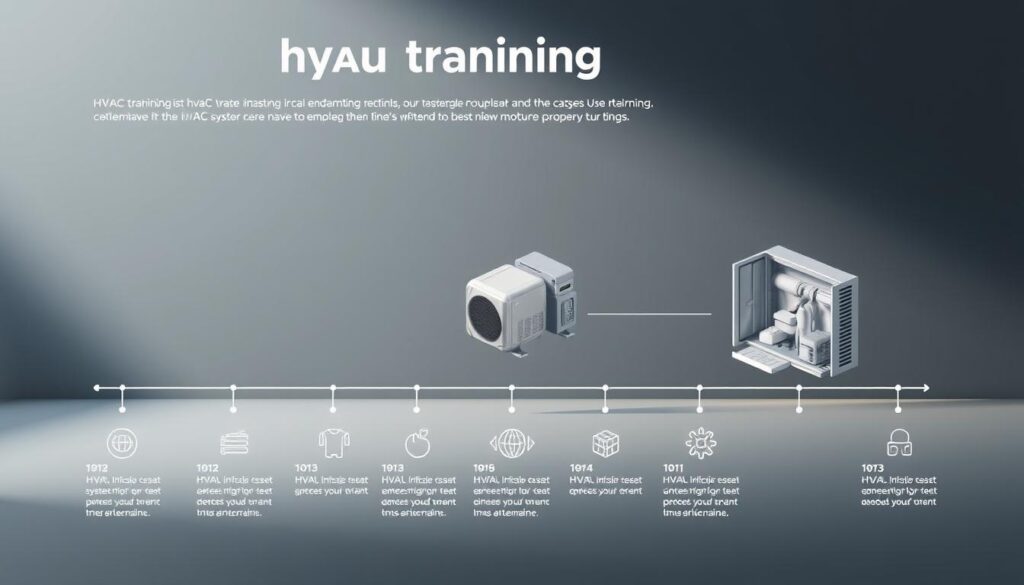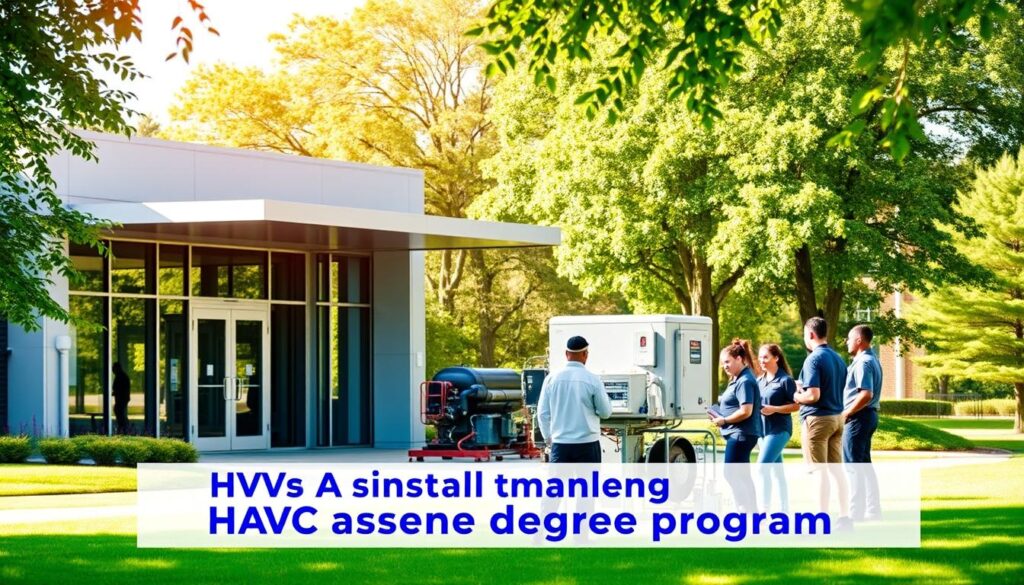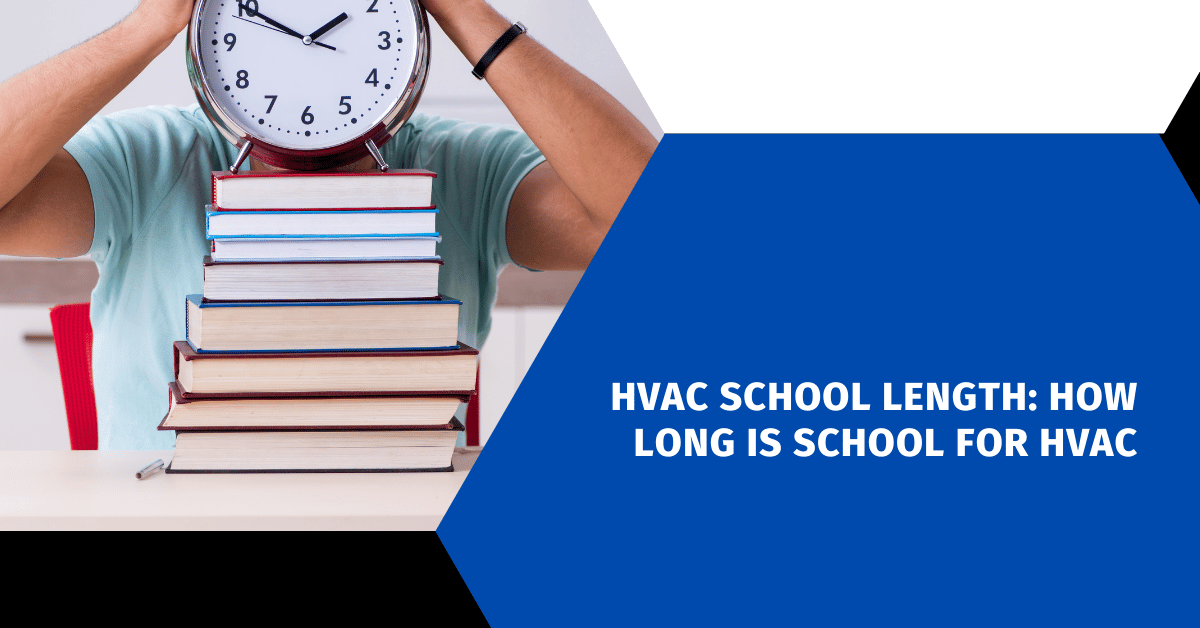Affiliate Disclosure
HVAC Guide Guys is a participant in the Amazon Services LLC Associates Program, an affiliate advertising program designed to provide a means for sites to earn advertising fees by advertising and linking to Amazon.
How Long Is School For HVAC? Are you curious about how long it takes to become an HVAC technician? This career in heating, ventilation, and air conditioning is promising. The path to becoming an HVAC pro is flexible.

HVAC training can last from 6 months to 3 years. Your journey depends on the program you choose and your goals. You can pick from quick certificates to associate degrees, all leading to a growing field.
The HVAC industry is booming, with a 5% growth expected from 2021 to 2031. Knowing your training options helps you plan your future.
Key Takeaways
- HVAC training programs range from 6 months to 3 years
- Certificate programs offer the fastest route to entry
- Associate degrees provide more extensive training
- Apprenticeships combine classroom and hands-on learning
- Different programs suit different career goals and timelines
Table of Contents
The Complete Guide to HVAC Training Duration
Exploring HVAC training can seem daunting. But, knowing the different paths can help you choose wisely. Your HVAC journey’s length depends on several things, like the program and your goals.
Looking into HVAC degree timelines, you’ll find many educational paths. These paths cater to different learning styles and career goals. Let’s look at the main training options for future HVAC pros.
Program Types and Time Investments
HVAC training offers flexible options for everyone:
- Certificate Programs: 6-12 months
- Quick start to your career
- Focus on technical skills
- Associate Degree Programs: About 2 years
- Full technical education
- More career options
- Apprenticeship Programs: 3-5 years
- Classroom and on-the-job training
- Learn while earning
Key Considerations for Your HVAC Education
Choose a program that fits your career dreams, schedule, and budget. Community college HVAC programs usually cost around $15,000. Prices can range from $1,200 to $15,000 a year.
About 75% of HVAC technicians say hands-on training is key for skill growth.
No matter your choice, most programs teach important skills like wiring, electricity, and customer service. Success in HVAC requires both technical knowledge and practical skills.
Explore Our HVAC Shop
Looking for top-rated HVAC tools, parts, and accessories? Visit our shop and find the perfect solution for your needs.
Visit the ShopHow Long Is School For HVAC: Program Options Explained
Looking into HVAC program duration can be confusing. But knowing your options helps you choose the right path. The length of HVAC programs varies, giving you flexibility in your training.
- Certificate Programs: 6-12 months
- Associate Degree Programs: 18-36 months
- Apprenticeship Programs: Up to 4 years
Choosing the right program depends on your goals and how much time you have. Shorter certificate programs get you into the field fast. Longer degree paths offer more technical knowledge.
| Program Type | Duration | Career Readiness |
|---|---|---|
| Certificate Program | 6-12 months | Entry-level positions |
| Associate Degree | 18-36 months | Advanced technical roles |
| Apprenticeship | 3-4 years | Comprehensive professional training |
Investing in HVAC training can open doors to a rewarding career. The field is growing at 5% a year, with average salaries of $48,630. The right program will give you the skills and certifications you need.
Explore Our HVAC Shop
Looking for top-rated HVAC tools, parts, and accessories? Visit our shop and find the perfect solution for your needs.
Visit the ShopCertificate Programs: Fast-Track to HVAC Career
Starting your HVAC career doesn’t need to take years. Certificate programs offer a quick way into the heating, ventilation, and air conditioning field. They let you learn key skills fast and start working quickly.
These programs pack essential technical knowledge into a short time, usually 6 to 12 months. You’ll learn practical skills for entry-level HVAC technician jobs.
Six-Month Certificate Program Highlights
- Condensed curriculum focusing on core technical skills
- Hands-on laboratory experiences
- EPA certification preparation
- Basic tool and equipment training
Comprehensive Program Components
| Course | Credit Hours | Focus Area |
|---|---|---|
| Basic Refrigeration Systems | 4 | System fundamentals |
| HVACR Electricity | 4 | Electrical systems |
| Heating Residential Appliances | 4 | Residential heating technologies |
| EPA Certification Preparation | 2 | Regulatory compliance |
Certification Requirements
To finish your certificate, you’ll need to learn technical skills and pass the EPA Section 608 certification exam. This shows you’re ready to work in HVAC.
Accelerated HVAC training programs can help you start your career in as little as 4-6 months!
Choosing a certificate program means you invest a little time for a lot of practical knowledge. It’s a smart start for a technical career.
Explore Our HVAC Shop
Looking for top-rated HVAC tools, parts, and accessories? Visit our shop and find the perfect solution for your needs.
Visit the ShopAssociate Degree Programs in HVAC Technology

An associate degree in HVAC technology is a deep dive into heating, ventilation, and air conditioning systems. It usually takes two years to complete. This education goes beyond what you get from basic certificate programs.
Associate degree programs in HVAC last from 60 to 79.5 credit hours. This depends on the school. These programs mix technical skills with important theory.
- Total program length: Approximately 24 months
- Credit hours required: 60-79.5 credits
- Typical cost: Around $10,703 for complete program
Your associate degree curriculum includes:
- Technical course credits (24 hours)
- Program-specific coursework (18 hours)
- General education requirements (16 hours)
Choosing an associate degree program gets you ready for advanced HVAC jobs. You’ll learn about energy efficiency, advanced troubleshooting, and building automation. Many employers look for this level of education. This can lead to better job opportunities and higher pay than certificate programs.
By 2032, HVAC technician employment is expected to grow 6% – faster than the average 3% across all occupations.
Investing in an associate degree boosts your career in the fast-changing HVAC technology field.
HVAC Apprenticeship Programs and Timeline
Starting an HVAC apprenticeship is a great way to become a skilled technician. These programs mix hands-on training with classroom learning. They’re perfect for those who want to learn by doing in the HVAC field.
How long you’ll be in an HVAC program varies from 3 to 5 years. This depends on state rules and the program you choose. You’ll learn a lot by working on real projects and studying in class.
On-the-Job Training Duration
Apprenticeships focus on learning by doing. You’ll spend:
- 2,000 hours of on-the-job training each year
- Working under the watchful eye of seasoned HVAC pros
- Getting practical experience in homes and businesses
Classroom Instruction Hours
There’s also a lot of learning in class:
- 144 hours of classroom learning every year
- A wide range of topics, including:
- Gas and electric furnace systems
- Refrigeration technologies
- Smart thermostat operations
Apprenticeship Completion Requirements
To finish your apprenticeship, you must:
- Finish all required training hours
- Pass technical tests
- Get EPA certification
- Show you’re good at working with HVAC systems
Note: The exact needs for your apprenticeship might change based on where you live. Always check local rules for your program’s details.
Explore Our HVAC Shop
Looking for top-rated HVAC tools, parts, and accessories? Visit our shop and find the perfect solution for your needs.
Visit the ShopFactors Affecting HVAC Training Duration
How long you spend in HVAC training can change a lot. Knowing what affects it helps you plan better. This way, you can pick the best path for your career.
Several things can change how long your HVAC training lasts:
- Prior Experience: If you already know some mechanical trades, you might finish faster.
- How Fast You Learn: Some people pick up technical stuff quicker than others.
- How Intense the Program Is: Studying full-time or part-time makes a big difference.
- Other Commitments: Work and family can make your training take longer.
Typically, HVAC training lasts from six months to two years. Vocational school certificates usually take 6-12 months. Community college associate degrees take about two years. Apprenticeships can last 2-5 years, giving you lots of hands-on experience.
Things that can speed up or slow down your training include:
- Certification needs
- State licensing rules
- The specific program you choose
- How fast you learn
Choosing a program that’s accredited and has experienced instructors helps a lot. Programs with flexible schedules let you balance training with life. This way, you can start your HVAC career without delays.
Core Skills and Course Components
Getting your HVAC certification means learning a lot of technical skills and practical knowledge. The time it takes to get certified can vary. But, most programs focus on teaching you the key skills needed for a career in HVAC.
While you’re in your hvac degree program, you’ll learn a lot. The curriculum is designed to make you a skilled professional. You’ll study important areas like:
- Technical Knowledge Requirements
- HVAC system design principles
- Electrical systems fundamentals
- Refrigeration cycle understanding
- Thermodynamics and heat transfer
- Practical Training Elements
- Equipment maintenance techniques
- Troubleshooting complex systems
- Installation procedures
- Safety protocol implementation
Industry Certifications
Your training will also get you ready for important industry certifications. These can make you stand out in your career. Key certifications include:
- NATE (North American Technician Excellence)
- HVAC Excellence Certification
- EPA Section 608 Technician Certification
Tip: Getting these certifications can really help your job chances and salary in HVACR.
Explore Our HVAC Shop
Looking for top-rated HVAC tools, parts, and accessories? Visit our shop and find the perfect solution for your needs.
Visit the ShopCareer Prospects and Job Market Timeline

Starting your HVAC vocational training can lead to exciting career paths in a booming field. The Bureau of Labor Statistics predicts a 4% increase in HVAC technician jobs from 2019 to 2029. This growth shows a strong need for experts in heating, ventilation, and air conditioning.
The HVAC technician job market is full of opportunities. Your training duration will determine your starting point in the field:
- Entry-level technician positions
- Specialized residential service roles
- Commercial and industrial system maintenance
- Advanced technical management positions
Salaries for HVAC technicians vary with experience and skills. In May 2020, the median annual wage was $50,590. Top earners make even more. Your career growth depends on:
- Comprehensive training programs
- Professional certifications
- Continuous skill development
- Specialization in advanced system technologies
| Career Stage | Typical Earnings | Required Training |
|---|---|---|
| Entry-Level | $35,000 – $42,000 | 6-12 months training |
| Mid-Level | $45,000 – $55,000 | 2-year associate degree |
| Senior Technician | $60,000 – $75,000 | 5+ years experience |
Investing in HVAC training can lead to a stable and fulfilling career. The industry’s growth is fueled by more building projects and complex climate control systems. This ensures a steady demand for skilled professionals.
Conclusion
Choosing the right HVAC training depends on your goals and how much time you have. Training can last from a few months to 2 years or even 5 years. Knowing these options helps you decide on your career path.
There are many ways to start in HVAC training. You can pick a 6-month program or a 2-year degree. Each option has its own benefits. Think about your career goals, how you learn best, and your schedule.
Investing in HVAC training is key to your future. The length of your training affects your skills and job chances. Getting certifications like EPA Section 608 or NATE can boost your career.
Your dedication to learning HVAC skills is vital. Look into different programs, talk to experts, and pick what fits your career dreams. The right education in HVAC can lead to a fulfilling and secure career.
FAQ
How long does it typically take to complete an HVAC training program?
What’s the difference between a certificate program and an associate degree in HVAC?
Can I work while studying HVAC?
What factors can affect the length of my HVAC training?
Are online HVAC programs available?
What certifications will I need after completing my HVAC training?
How much does HVAC training typically cost?
How long does it typically take to complete an HVAC training program?
What’s the difference between a certificate program and an associate degree in HVAC?
Can I work while studying HVAC?
What factors can affect the length of my HVAC training?
Are online HVAC programs available?
What certifications will I need after completing my HVAC training?
How much does HVAC training typically cost?
FAQ
How long does it typically take to complete an HVAC training program?
HVAC training programs vary in length. Certificate programs can take 6-12 months. Associate degree programs last 2 years. Apprenticeships usually run for 4 years. The duration depends on the program and your study pace.
What’s the difference between a certificate program and an associate degree in HVAC?
Certificate programs are shorter, lasting 6-12 months. They provide basic HVAC skills. Associate degrees are 2-year programs that offer deeper technical knowledge and better career opportunities.
Can I work while studying HVAC?
Yes, many HVAC programs offer part-time and flexible scheduling. Apprenticeship programs are great as they let you earn while learning. You get on-the-job training and classroom instruction.
What factors can affect the length of my HVAC training?
Several factors can impact your HVAC training duration. These include prior experience, learning ability, study mode, personal commitments, and the program you choose.
Are online HVAC programs available?
Yes, many institutions offer online or hybrid HVAC programs. But, most programs require some in-person practical training to develop essential technical skills.
What certifications will I need after completing my HVAC training?
You’ll need certifications like NATE (North American Technician Excellence) and HVAC Excellence. Some states require specific licensing for HVAC technicians. Your training will prepare you for these certifications.
How much does HVAC training typically cost?
Costs vary widely. Certificate programs range from
FAQ
How long does it typically take to complete an HVAC training program?
HVAC training programs vary in length. Certificate programs can take 6-12 months. Associate degree programs last 2 years. Apprenticeships usually run for 4 years. The duration depends on the program and your study pace.
What’s the difference between a certificate program and an associate degree in HVAC?
Certificate programs are shorter, lasting 6-12 months. They provide basic HVAC skills. Associate degrees are 2-year programs that offer deeper technical knowledge and better career opportunities.
Can I work while studying HVAC?
Yes, many HVAC programs offer part-time and flexible scheduling. Apprenticeship programs are great as they let you earn while learning. You get on-the-job training and classroom instruction.
What factors can affect the length of my HVAC training?
Several factors can impact your HVAC training duration. These include prior experience, learning ability, study mode, personal commitments, and the program you choose.
Are online HVAC programs available?
Yes, many institutions offer online or hybrid HVAC programs. But, most programs require some in-person practical training to develop essential technical skills.
What certifications will I need after completing my HVAC training?
You’ll need certifications like NATE (North American Technician Excellence) and HVAC Excellence. Some states require specific licensing for HVAC technicians. Your training will prepare you for these certifications.
How much does HVAC training typically cost?
Costs vary widely. Certificate programs range from $1,200 to $15,000. Associate degrees cost between $10,000 and $30,000. Apprenticeship programs often have lower costs as you earn while learning.
What are the career prospects after completing HVAC training?
The HVAC industry shows strong job growth. The Bureau of Labor Statistics projects a 5% increase in job opportunities through 2030. Trained technicians can find work in various settings with competitive salaries.
Is HVAC training physically demanding?
Yes, HVAC technicians need to be physically fit. The job involves lifting heavy equipment, working in confined spaces, climbing ladders, and performing tasks in various weather conditions and environments.
Can I specialize in a specific area of HVAC during my training?
Many programs offer specialization options. You can specialize in residential HVAC, commercial refrigeration, energy management, or green HVAC technologies. Advanced associate degree programs often provide more opportunities for specialized training.
,200 to ,000. Associate degrees cost between ,000 and ,000. Apprenticeship programs often have lower costs as you earn while learning.
What are the career prospects after completing HVAC training?
The HVAC industry shows strong job growth. The Bureau of Labor Statistics projects a 5% increase in job opportunities through 2030. Trained technicians can find work in various settings with competitive salaries.
Is HVAC training physically demanding?
Yes, HVAC technicians need to be physically fit. The job involves lifting heavy equipment, working in confined spaces, climbing ladders, and performing tasks in various weather conditions and environments.
Can I specialize in a specific area of HVAC during my training?
Many programs offer specialization options. You can specialize in residential HVAC, commercial refrigeration, energy management, or green HVAC technologies. Advanced associate degree programs often provide more opportunities for specialized training.

